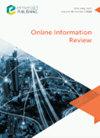了解中国中年及以上人群的健康错误信息分享:社交媒体健康信息寻求、误解和信息加工倾向的作用
IF 3.1
3区 管理学
Q2 COMPUTER SCIENCE, INFORMATION SYSTEMS
引用次数: 1
摘要
社交媒体上不断膨胀的健康错误信息引发了严重担忧。基于S-O-R(刺激-机体-反应)模型和信息加工文献,本研究旨在探讨(1)社交媒体健康信息寻求(S)如何通过健康误解(O)渠道影响健康错误信息分享意愿(R);(2)中介过程是否取决于不同的信息加工倾向。设计/方法/方法数据收集自一项调查,包括388名中国中年及以上人群的受访者,这是中国最容易受到健康错误信息影响的人群之一。采用标准多元线性回归模型和PROCESS Macro来检验直接效应和调节的中介模型。研究结果支持了基于s - o - r的机制,在该机制中,健康误解介导了社交媒体健康信息寻求对健康错误信息分享意愿的影响。作为分析性信息加工的指标,认知需要(NFC)对中介过程没有调节作用。相反,直觉信念(FI),一个反映直觉信息处理的指标,起到了显著的调节作用。社交媒体健康信息寻求与误解之间的正相关关系在低FI的受访者中更强。原创性/价值本研究通过连接健康信息寻求、信息内化和信息共享,揭示了健康错误信息共享研究。此外,作者通过整合信息处理倾向扩展了S-O-R模型,这与之前的文献不同,并推进了对信息处理风格如何面对在线健康错误信息的现有理解。特定年龄组和中国背景进一步说明了在线健康错误信息监管的具体情况。同行评议本文的同行评议历史可在:https://publons.com/publon/10.1108/OIR-04-2023-0157。本文章由计算机程序翻译,如有差异,请以英文原文为准。
Understanding health misinformation sharing among the middle-aged or above in China: roles of social media health information seeking, misperceptions and information processing predispositions
PurposeThe ballooning health misinformation on social media raises grave concerns. Drawing upon the S-O-R (Stimulus-Organism-Response) model and the information processing literature, this study aims to explore (1) how social media health information seeking (S) affects health misinformation sharing intention (R) through the channel of health misperceptions (O) and (2) whether the mediation process would be contingent upon different information processing predispositions.Design/methodology/approachData were collected from a survey comprising 388 respondents from the Chinese middle-aged or above group, one of China's most susceptible populations to health misinformation. Standard multiple linear regression models and the PROCESS Macro were adopted to examine the direct effect and the moderated mediation model.FindingsResults bolstered the S-O-R-based mechanism, in which health misperceptions mediated social media health information seeking's effect on health misinformation sharing intention. As an indicator of analytical information processing, need for cognition (NFC) failed to moderate the mediation process. Contrarily, faith in intuition (FI), an indicator reflecting intuitive information processing, served as a significant moderator. The positive association between social media health information seeking and misperceptions was stronger among respondents with low FI.Originality/valueThis study sheds light on health misinformation sharing research by bridging health information seeking, information internalization and information sharing. Moreover, the authors extended the S-O-R model by integrating information processing predispositions, which differs this study from previous literature and advances the extant understanding of how information processing styles work in the face of online health misinformation. The particular age group and the Chinese context further inform context-specific implications regarding online health misinformation regulation.Peer reviewThe peer review history for this article is available at: https://publons.com/publon/10.1108/OIR-04-2023-0157.
求助全文
通过发布文献求助,成功后即可免费获取论文全文。
去求助
来源期刊

Online Information Review
工程技术-计算机:信息系统
CiteScore
6.90
自引率
16.10%
发文量
67
审稿时长
6 months
期刊介绍:
The journal provides a multi-disciplinary forum for scholars from a range of fields, including information studies/iSchools, data studies, internet studies, media and communication studies and information systems.
Publishes research on the social, political and ethical aspects of emergent digital information practices and platforms, and welcomes submissions that draw upon critical and socio-technical perspectives in order to address these developments.
Welcomes empirical, conceptual and methodological contributions on any topics relevant to the broad field of digital information and communication, however we are particularly interested in receiving submissions that address emerging issues around the below topics.
Coverage includes (but is not limited to):
•Online communities, social networking and social media, including online political communication; crowdsourcing; positive computing and wellbeing.
•The social drivers and implications of emerging data practices, including open data; big data; data journeys and flows; and research data management.
•Digital transformations including organisations’ use of information technologies (e.g. Internet of Things and digitisation of user experience) to improve economic and social welfare, health and wellbeing, and protect the environment.
•Developments in digital scholarship and the production and use of scholarly content.
•Online and digital research methods, including their ethical aspects.
 求助内容:
求助内容: 应助结果提醒方式:
应助结果提醒方式:


